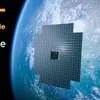
Pixxel, a space-tech trendsetter, supported by renowned entities such as Google and investment firms Blume Ventures and Omnivore VC, has been honoured with a sizeable grant from iDEX (Innovations For Defence Excellence). This initiative, established by the Ministry of Defence, will facilitate Pixxel’s mission of fabricating petite, multi-purpose satellites for India’s Air Force. Though the exact value of the grant remains veiled, it’s known to be in the multi-crore spectrum.
Founded by Awais Ahmed and Kshitij Khandelwal in 2019, Pixxel excels in crafting hyperspectral imaging satellites. These state-of-the-art devices deliver instantaneous, AI-facilitated data relating to various environmental phenomena. Pixxel’s rapid ascension in the space-tech domain is reflected in its impressive funding pool of $71 Mn, which includes a fresh contribution of $36 Mn from a recent Series B round.
The iDEX grant, associated with the Mission DefSpace Challenge under the broader umbrella of the iDEX Prime (Space) initiative, positions Pixxel to develop agile satellites that weigh no more than 150 kilograms. These multi-purpose satellites, designed for electro-optical, infrared, synthetic aperture radar, and hyperspectral tasks, will enhance India’s defense architecture and expand the country’s space technology capabilities.
Expressing joy at the recognition, Pixxel’s CEO, Awais Ahmed, hails the grant as an affirmation of the company’s commitment to continuously push the envelope in space exploration and innovation.
The iDEX initiative is a strategic plan by the Ministry of Defence to stimulate tech evolution in the defence and aerospace sectors, involving an eclectic mix of MSMEs, startups, and R&D institutes. Pixxel’s grant symbolises a crucial step towards India’s vision of self-reliance in the space technology field.
As part of its ambitious roadmap, Pixxel intends to send six satellites into orbit in 2024, and a staggering 18 in 2025. These satellites will harvest crucial hyperspectral images of our planet, gathering data across a multitude of electromagnetic spectrum wavelengths, thereby significantly enriching our understanding of Earth’s wellness.
This recent advancement underlines the swift progression of India’s space-tech sector, with pioneers like Pixxel, Agnikul, and Skyroot Aerospace leading the way. Forecasts suggest that India’s space-tech market may touch a formidable $77 Bn by 2030. Given India’s unwavering dedication to fostering deep-tech innovations, the future promises an array of astounding space-tech milestones.
.thumbnailWrapper
width:6.62rem !important;
.alsoReadTitleImage
min-width: 81px !important;
min-height: 81px !important;
.alsoReadMainTitleText
font-size: 14px !important;
line-height: 20px !important;
.alsoReadHeadText
font-size: 24px !important;
line-height: 20px !important;











